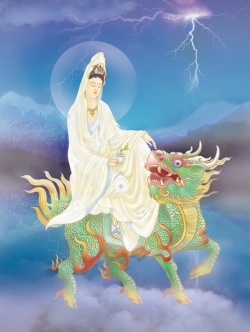Avadanas
Avadāna; (Sanskrit; Pali cognate: Apadāna) is the name given to a type of Buddhist literature correlating past lives' virtuous deeds to subsequent lives' events. While including accounts from the Pali Vinaya Pitaka ("Basket of Discipline"), this literature also includes a large number of Sanskrit collections, of which the chief are the Mahāsaṅghika's Mahāvastu ("Great Book"), and the Sarvāstivāda's Avadanasataka (Century of Legends) and Divyavadana (The Heavenly Legend). These latter collections include accounts relating to Buddha Gautama and the third-century BC "righteous ruler," Asoka.
Amongst the most popular avadānas of Northern Hinayāna Buddhism are:
the story of Sudhana, preserved in the Mahāvastu under the title Kinnarījātaka, amongst others, who falls in love with a kinnarī and saves her life
the Vessantara jātaka, the story of the compassionate prince who gives away everything he owns, including his wife and children, thereby displaying the virtue of perfect charity.
the Suvannasankhajātaka
Though of later date than most of the canonical Buddhist books, avadānas are held in veneration by the orthodox, and occupy much the same position with regard to Buddhism that the Puranas do towards Hinduism. They act in a similar way to other texts describing past deeds or past lives held in other traditions in the region, such as the aforementioned Puranas, the Dasam Granth and Janamsakhis of Sikhism, and the Kalpa Sutra of Jainism.
